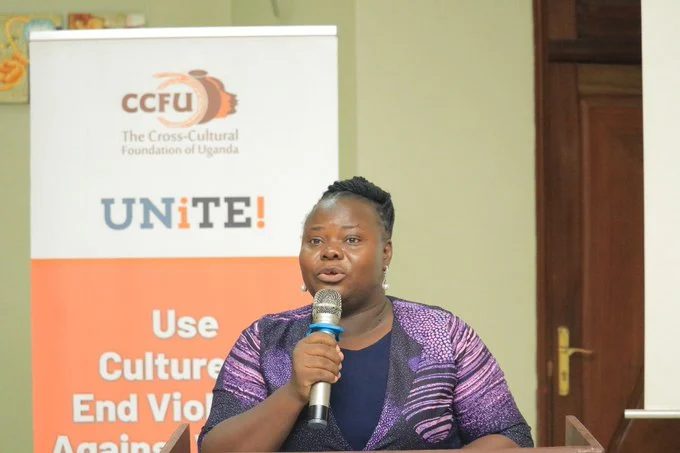A new study done by the Cross-Cultural Foundation of Uganda (CCFU), a Non-Governmental Organisation has shown that positive cultural resources can be of great help in addressing violence against women and girls, promote their sexual and reproductive health rights and access to justice.
The research was carried out in six cultural communities of Acholi, Buganda, Busoga, Tooro, Alur and Karamoja.
“The breakdown in traditional forms of socialisation of boys and girls, and the rundown of courtship and marriage that came with inter-family regulation and arbitration mechanisms has rendered marriages arbitrary and more vulnerable to shocks. While traditional arbitration forms were keener on reconciliation and restitution, modern institutions such as Police and courts of law are more punitive in inclination,” the study says.
Also Read: Police Has Arrested a Woman Over Child Violence
The study shows that fearing the consequences of reporting violence to such institutions, much resort to either silence or resolving their family problems through fights.
“Among the Acholi, the many years that people spent in camps during the 1987-2005 war severely affected cultural norms due to a changed social and physical set up. Habits such as prostitution, alcoholism, laziness (dependency on free things), and irresponsible sexual activity were bred in camps and are still widely prevalent, especially in urban and semi-urban settings where cultural regulation is most affected. Little wonder then that cases of violence against women were reported to be more prevalent in the urban than in rural areas.”
According to Dr.Jimmy Spire Ssentongo who led the team that conducted the study, whereas culture is always presented as an impediment to ending violence against women and girls, the reverse is true.
“You will always find that culture is present as an impediment and because many have got that thinking, even when there are positive things to learn from our cultures, we don’t take them. We simply ignore them. This study was meant to pick out these elements that could help end violence and promote them,”Dr.Ssentongo said.
“For most of these cultural or religious things, there is something negative said about them. There being a negative aspect doesn’t mean you label everything as negative. Whereas there are many aspects that are bad and need to be abandoned in culture, there are many other good aspects that have been put under that blanket yet they are good. We are not saying culture is perfect but there is something we can learn from it other than things from outside which on several occasions fail in our context because they are not really grounded.”
The State minister for Gender and Culture, Peace Mutuuzo reasoned with the survey saying culture is a great tool to help end violence against women and girls in society.
“Often times, culture has for long been looked at as an inhibitor rather than a solution to the challenge of violence against women and girls but the research poses opportunities for the recognition of cultural resources such as the cultural principle of obuntu bulamu, the traditional learning spaces as relevant to end the problem of gender based violence. Traditional transmission and learning mechanisms, for example ekyoto all aim at transforming young people into responsible adults, men and women and promote respect and protection of women and girls from violence,” Mutuuzo said.
“The traditional justice systems of truth telling ( ajaa ) in Alur and mechanisms like akiriket in Karamoja all pose great opportunities to ease access to justice for the women and girls within the cultural communities. “
Minister Mutuuzo said the survey is an important eye opener which reveals the role of culture in promoting the rights of women and girls but also reveals that culture is rich with a wealth of resources which if harnessed can help in preventing violence against women and girls and also promote sexual reproductive health and rights of women.
“There are aspects of culture that can be a strong springboard and resource for women’s empowerment. Culture’s limitations can also be overcome through community driven adjustments.”
The minister urged all the cultural institutions in the country to learn from the survey and embrace their cultural resources to end violence against women and girls.
According to Barbra Babweteera, the Cross-Cultural Foundation of Uganda (CCFU) Executive Director, cultural ought to be looked at as a toll to help end violence.
“There are positive cultural resources in terms of practices, values and principles, proverbs and old history that helps in ending violence against women and girls. The whole notion of humanness ( obuntu bulamu) has a lot of values if we all respect, violence would be history in our country. If we talk about value of equality and justice, sense of shame for oneself are principals that can help one check themselves against violence,”Babweteera.
She noted that working with traditional learning spaces is also key in ending violence.
“The nurturing starts when parents or elders sit with children at spaces like ekyoto( fire place), olwaliiro(eating place) and tell them about the good values and practices of their culture. These are opportunities existing but all we need to do is innovation around them because of the circumstances today.”

